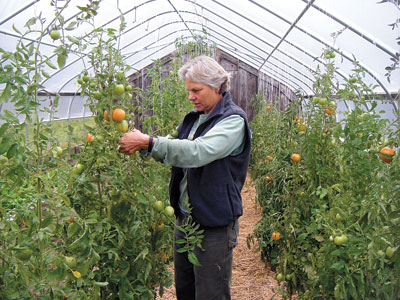 |
| Rosey Guest, harvesting tomatoes in mid-October in her unheated hoop house. All photos by Holli Cederholm. |
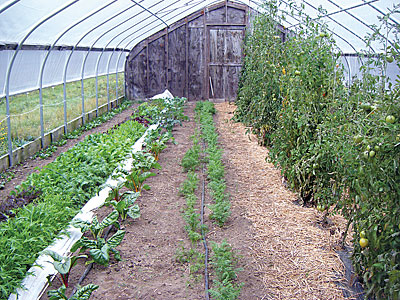 |
| After the tomatoes are done, Rosey runs a fence down the middle of the house and keeps her layers in there for a month. They scratch for bugs and add fertility for the following season. Greens and tomatoes are rotated year-to-year. |
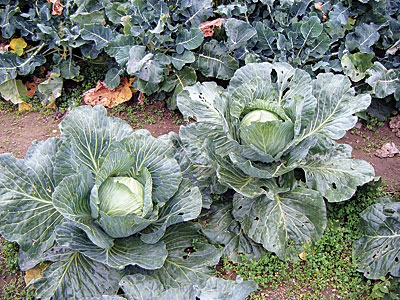 |
| ‘Storage No. 4’ cabbages are one of the fall crops Rosey plants for her CSA. After the “best of the season” share ends in October, Bluebird Hill Farm offers a bimonthly preorder buying club to CSA members. |
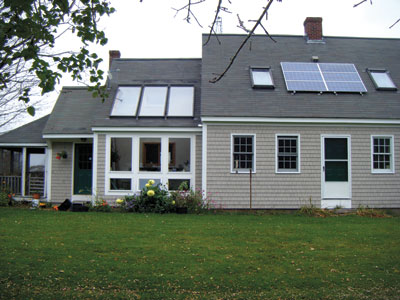 |
| Rosey and Bill Guest’s off-the-grid cape-style home is wood-heated and solar-powered. |
 |
| A 6- by 12-foot atrium is used for starting seedlings and housing the brooder for laying hens and broiler chickens in the spring, and for drying fruit leathers, tomatoes, hot peppers and dry beans in summer and fall. |
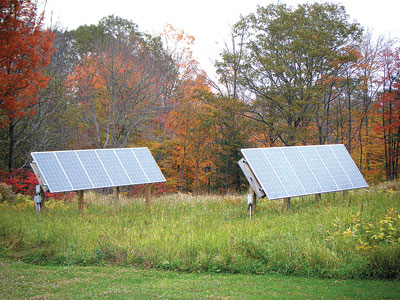 |
| Additional solar panels were added to the system to replace a wind turbine lost to lightning. |
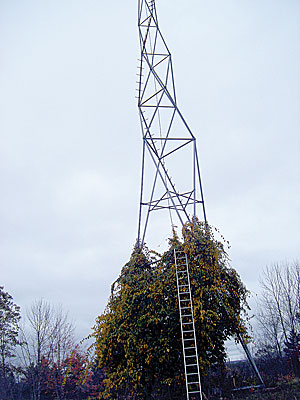 |
| A wind turbine tower provides support for hardy kiwi. |
By Holli Cederholm
Bluebird Hill Farm is situated on 50 acres nestled at the end of a wood-hemmed road, bearing the same name as the farm, in Jefferson, Maine. Around 35 acres are forested, with the remaining 15 acres cleared as the center of Rosey and Bill Guest’s solar-powered farm.
Rosey grew up with gardens and “a barnyard full of animals” but found her formal introduction to agriculture through MOFGA’s apprenticeship program. In 1978, she spent the season with Paul and Mollie Birdsall of Horsepower Farm in Penobscot, Maine.
When she joined Bill Guest on his land in Jefferson in 1981, she started her first garden at a neighbor’s house while they readied ground for planting on-site. The land under cultivation evolved over time, expanding as the Guests’ two daughters grew older. “I had a much smaller garden when the kids were smaller,” says Rosey.
Bluebird Hill Farm’s markets shifted as well. “I started out thinking I was going to take vegetables around the [Damariscotta] lake,” says Rosey. But after a year of targeting the “cottage colony,” she switched gears and joined the Waldoboro Farmers’ Market. “It was before the time that farmers’ markets were very popular, like they are now.” Rosey also marketed select crops, such as lettuces, to area restaurants.
She now cultivates approximately 1-1/2 acres of mixed vegetables, annual and perennial flowers, and culinary herbs. She also makes maple syrup, tends a smattering of small fruits (apples, hardy kiwis, raspberries and strawberries), keeps a flock of two dozen layer hens, raises an annual batch of broilers and puts by a hearty portion of the family diet. Pigs and guinea hens have been part of the farmstead as well over the years. “I wanted to do something that, if I didn’t get an apprentice, I would be able to manage on my own,” she says.
Her garden beds are characterized by tidy rows of crops blocked by season − fall brassicas, such as cabbage and broccoli, will often occupy the same space, as will summer heat-loving crops, such as eggplant and husk cherries. This allows for easier crop rotation and maximum cover cropping. Rosey is always experimenting with cover cropping. Last year’s favorite trial: vetch seeded between her winter squash.
Bluebird Hill has since shifted from weekly farmers’ markets to a CSA (Community Supported Agriculture) model but maintains a handful of wholesale accounts, including the A-1 Diner in Gardiner, Harvest Time in Augusta and Rising Tide Co-op in Damariscotta. The full spread of crops that Rosey cultivates can be attributed to her CSA. Her once-a-week drop-offs of pre-packaged shares to Damariscotta and Gardiner coincide with wholesale deliveries.
The farm offers a four-week spring CSA share − perfect for gardeners hungry for earlier produce than they can grow themselves. This share also complements the main-season, or “best of the season,” share, which spans the bounty from June through October. Other share add-ons include a weekly dozen of farm-fresh eggs and a “country bouquet” flower share; the latter runs from mid-July through September. “Flowers are food for my soul,” says Rosey.
A type of email buying club rounds out Bluebird Hill’s offerings; CSA members can preorder bimonthly from a selection of storage crops. “There’s a bunch of fall crops that I like to do,” says Rosey.
Bluebird Hill Farm also provides Senior Farm Shares and has been participating annually at MOFGA’s Common Ground Country Fair Farmers’ Market since the Fair was in Windsor.
Farming Off the Grid
Rosey and Bill started carving out their home and business in the early 1980s − building a shop first for Bill’s work as a logger using cut-to-length equipment. The building’s footprint includes an adjacent living space − one large open room with a sleeping loft − where they lived until they built their house five years later. This now serves as the apprentice quarters.
Their traditional cape-style house has added design considerations: It has a 6- by 12-foot glass-windowed atrium on its south-facing side, and part of the farm’s solar array rests on the roof. Additional freestanding panels add to their 4,200-watt solar system. Until an unfortunate lightning strike several years ago, they relied on a small wind turbine, instead of the extra panels, to augment their power load.
The Guests’ decision not to hook into the main power grid weighs into other lifestyle choices. For instance, without power to run a furnace, they opted for a Russian-style masonry stove as their primary heat source. A wood-fired cook stove in the farmhouse kitchen is a practical way to take the chill off the edges of the seasons when the masonry stove may be unnecessary. Both stoves are fueled by wood that Bill cuts either on-site or at the site of one of his logging contracts.
They’ve also been conservative with assessing other farm energy needs. While they do have a small (12-volt) electric refrigerator, they weren’t able to power a chest freezer until their recent solar panel expansion. Instead they kept their annual harvest of broiler chickens at a neighbor’s house.
Raising chickens calls for special attention from the start. Day-old chicks arrive at Bluebird Hill in June and are housed in the atrium. Their power system can’t sustain an energy-draining heat lamp. Instead chicks are kept warm the old-fashioned way: with newspaper-wrapped bricks, which are heated in the oven and placed on the floor of the brooder. Rosey sometimes suspends a regular lamp overhead for extra warmth.
Rosey and Bill are mindful of other resources as well. In shaping their farmstead, they relied on two dug wells for water. Rosey would forego laundry during the summer, and her apprentices have been known to haul water from catchment cisterns located under the shop eaves to irrigate the hoop house tomatoes. Bluebird Hill has an ample water supply now, but Rosey prefers to rely on the sky to quench her crops. She uses drip irrigation only in her hoop house. Even a small leak at a T-tape headline connection seems wasteful to her.
Two other features becoming mainstays in modern farms are absent at Bluebird Hill: a refrigeration system for produce storage and a heat source for her hoop houses. Rosey harvests everything the day of delivery and packs fresh produce in coolers, eliminating the need for a walk-in cooler. As for starting seedlings to get a jump on the growing season, she seeds tender cultivars in the house-connected atrium. When its three wooden shelves reach maximum capacity, she starts to move hardy seedlings, such as alliums, to an unheated hoop house designated for hardening off seedlings. In cold springs, this could mean a shuffle back-and-forth to avoid exposing seedlings to severe temperatures.
Apprentice to Mentor
Rosey enlisted her first MOFGA apprentice at Bluebird Hill Farm while her daughters were still young. “It was such a positive, directing experience for me … I felt I wanted to share.”
Each season Rosey invites one apprentice to live with her family and work alongside her in the field. A typical season’s tasks will run the gamut of small-scale market growing and subsistence living. Apprentices move through the farm’s seasonal rhythms, experiencing composting, canning (for the pantry as well as for sale), small fruit maintenance and livestock care along with the daily vegetable routine.
“They’ve been such an enriching part of our family life,” says Rosey. In return, she carefully tries to foster a relationship in which apprentices feel valued, and not just as a source of labor. “A common challenge for good mentoring for apprentices is to find that balance between working and learning.”
Rosey helps countless other prospective apprentices in their placement on Maine farms as MOFGA’s volunteer apprentice coordinator. Her role involves reading through incoming apprentice applications, notifying prospectives if any of the 12 farms they’re applying to are full for the season and suggesting similar hosts based on her intimate knowledge of the state’s organic farms. She can’t remember exactly when she started this service, but it pre-dated electronic applications. “I’ve been doing it long enough to see this really big shift,” says Rosey.
“Now the cool thing to do is to grow food.” She can remember when this wasn’t the case. In the early years of MOFGA’s apprenticeship program, with just 50 host farms, Rosey recalls that the applicant demographic was largely out-of-state college students with urban and suburban backgrounds. Now a lot of Mainers apply, and people are committing to a whole growing season rather than just a summer sandwiched between semesters. She also remembers past difficulties pairing apprentices with livestock farms, as a heavy tendency toward vegetarianism existed. “Now everybody wants to make cheese, everybody wants to grow meat.”
Rosey works closely with MOFGA’s educational programs director, Andrew Marshall, and new farmer programs coordinator, Abby Sadauckas, in planning the summer workshop series geared to enriching apprentices’ farm experiences. The Guests have hosted a “farming off-the-grid” workshop at their home in Jefferson in the past, and Rosey annually co-teaches a canning workshop at the MOFGA kitchen in Unity.
“I feel so lucky to hang out with all these amazing young people,” says Rosey. “It can make you feel like there’s such hope in the upcoming generation.”
About the author: Holli Cederholm was a MOFGA farmer-in-residence, with Brian St. Laurent. Their Proud Peasant Farm is now located in Washington, Maine.
